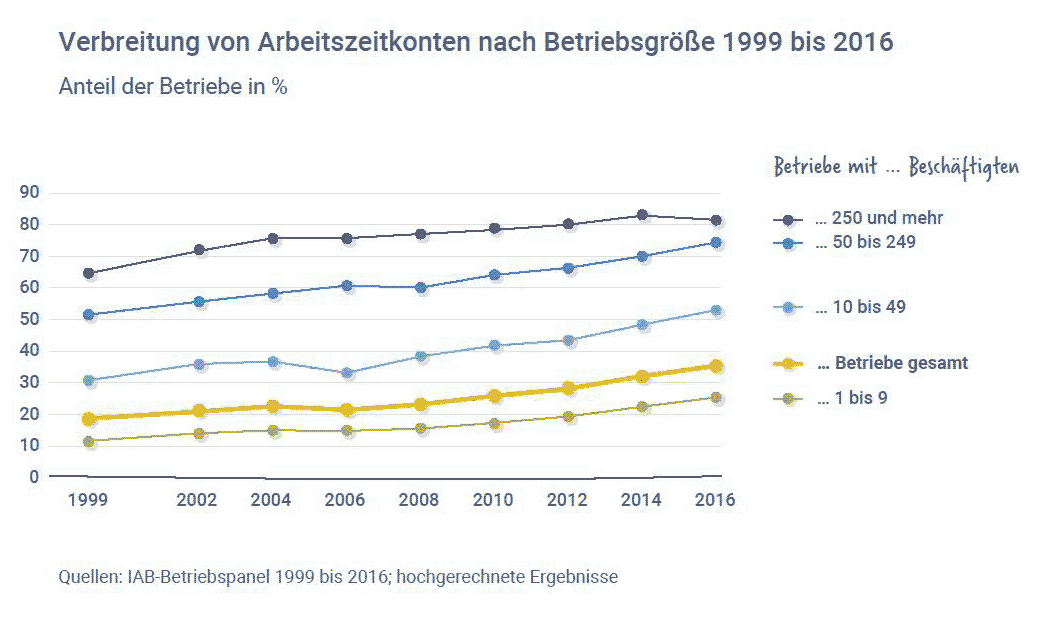Harnessing flexibility

©AdobeStock Quality Stock Arts
Working time is an important factor in giving companies the flexibility they need in the face of growing global competition, and thus in creating and securing jobs. Flexible working hours make it easier to reconcile work, family and private life and make jobs attractive, especially for skilled workers. The parties to collective agreements make an important contribution in this area through sector-specific regulations. They create the necessary balance for competitiveness to the low collectively agreed weekly working hours in Germany in international comparison.
Working time flexibility has many facets. The basic framework is the Working Hours Act (ArbZG). The law itself allows flexibility only within narrow limits, regularly linked to the observance of compensation periods that temporarily allow for deviation from the rule. In companies, working time accounts are a central instrument for taking account of both operational needs and the compatibility of family and career. With increasing digitalisation, mobile work and communication tools are also becoming more and more important as an aid to working time flexibility.
Adapt working time legislation to digitalisation
The Working Hours Act is an occupational health and safety law that regulates, in particular, the maximum permissible duration of daily working hours, as well as rest breaks during working hours and rest periods that employees must observe after completing their daily working hours. It regulates night work and shift work as well as rest on Sundays and public holidays and possible deviations from all this. It also provides for special rules for certain sectors, such as aviation, inland waterways and road transport. The parties to collective agreements can make limited exceptions in almost all areas and thus have a decisive influence on the organisation of working time in companies.
The Working Time Act transposes the EU Working Time Directive into German law. In some cases, it allows a greater degree of flexibility than our current Working Time Act, and this should be exploited. In order to equalise work performance and make it more manageable, the Working Time Act needs to be modernised in some places, also in order to meet the challenges of digitalisation. This includes that the Working Time Act should regulate the maximum working time in relation to the working week and not the working day. In addition, it should be possible to allow deviations from the eleven-hour minimum rest period by means of opening clauses for collective regulations, so that it can be temporarily adjusted to nine hours, for example, or divided into two blocks, one of which comprises a disturbance-free core rest period of seven hours.
Working time accounts an elementary component of working time flexibility
Working time accounts are an important element of flexibility in working time. They are an integral part of company personnel policy and it is no longer possible to imagine companies without them. In almost all sectors, collective agreements form the basis for working time flexibility through working time accounts. In particular, accounts that compensate for fluctuating order levels (so-called flexitime accounts) are widespread. They are an indispensable component of economic working time organisation and of central importance for the competitiveness of the German economy. This is particularly evident in times of economic strain, such as the pandemic. This is because flexitime accounts allow the volume of working time to be adjusted quickly and unbureaucratically to the needs of the business. If there are unforeseen economic slumps, working time accounts help to maintain employment by allowing working time credits to be used instead of issuing redundancy notices.
More extensive accounts with which long-term goals, in particular the individual and company organisation of working life, are planned (so-called lifetime working time accounts or time value accounts) are currently only used by a few companies. Against the background of demographic developments, however, lifetime working time accounts are becoming increasingly important for everyone. It must be possible to regulate their use in an unbureaucratic manner, even for smaller companies. The existing legal provisions therefore need to be reviewed. Employees in particular have often argued for interesting ways of using their accounts; these decisions must not be thwarted retrospectively with effect for the past.
Trust instead of impracticable obligations to provide evidence
The , that EU member states must require companies to set up a system to record the daily working time of their employees. The ECJ's decision is addressed to national legislators and not to companies. The German government is currently examining whether and how the decision must be implemented.
Should German working time law be changed, modern forms of working time recording must remain possible. This presupposes, for example, that companies can continue to delegate the recording of working time to their employees in the future. Without this possibility, mobile working is inconceivable. In addition, use must be made of the further leeway expressly granted by the ECJ for the concrete modalities of the implementation of such a system, in particular to determine its form, taking into account, where appropriate, the specificities of the respective field of activity or the peculiarities of certain undertakings, such as their size. In addition, further derogations from the scope of the Directive should be made for those workers whose working time is not measured and/or predetermined or can be determined by the workers themselves because of particular characteristics of the activity carried out.








